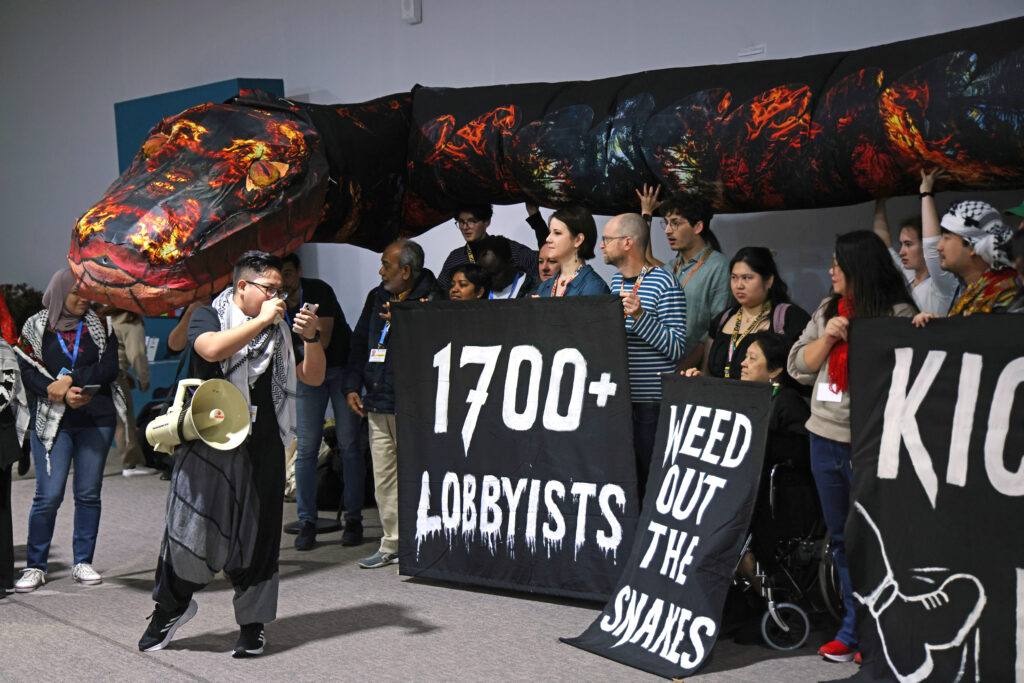BAKU, Azerbaijan—The COP29 climate conference commenced with controversy, mirroring last year’s issues in Dubai. Conflict-of-interest concerns have surfaced due to a senior official allegedly using the meeting to broker fossil fuel development deals.
Fossil fuel lobbyists at the conference notably outnumber all but the largest national delegations. This raises apprehensions about undue influence from oil and gas companies, potentially hindering global climate goals amid escalating climate change impacts.
A preliminary analysis by Kick Big Polluters Out reports at least 1,773 fossil fuel lobbyists present at the Baku conference, which contradicts COP29’s objectives, according to Rachitaa Gupta from the Global Campaign to Demand Climate Justice.
Gupta emphasized that fossil fuel companies should not participate in global talks. “It’s like consulting arsonists to rebuild your house,” she remarked.
Many corporate lobbyists attend as part of national delegations, giving them direct access to negotiators, Gupta noted. “This enables them to influence outcomes in real-time during negotiations,” potentially obstructing enforceable greenhouse gas emission cuts.
There are arguments for including the energy industry, as Samantha Gross from the Brookings Institution noted. “Involving existing energy industries is crucial due to their experience in executing large projects,” Gross stated.
However, Gupta argued that COP meetings should remain policy-focused, suggesting fossil fuel companies collaborate with governments outside these forums for technical solutions.
Inclusive Process Key to Success
The United Nations Framework Convention on Climate Change (UNFCCC) aims to include diverse voices, impacting emissions and generating climate financing. Frank Maisano, an experienced lobbyist, believes all stakeholders should participate to craft effective policies.
Maisano cited the Kigali Amendment as a precedent for successful industry collaboration. He stressed the unrealistic nature of excluding fossil fuels entirely from climate solutions.
Research suggests that the renewable energy transition boosts economic growth. The IPCC assessment warns of severe repercussions if fossil fuel emissions are not significantly reduced.
UNFCCC officials have not responded to queries about fossil fuel influence but previously stated that member states primarily drive the talks. Changes require consensus among major economies like Saudi Arabia, Russia, and the United States.
The growth of the conferences, with attendance reaching 80,000, has led to increased costs, prompting industry sponsorships for privileged access to negotiators, wrote Christina Toenshoff, a political scientist at Leiden University. Lobbyists often provide input on draft resolutions.
“For us, sharing space with those impacting our lives is not just heartbreaking, it is infuriating.”
— Rachitaa Gupta, Global Campaign to Demand Climate Justice
Lobbying in climate talks often involves advising on complex issues like carbon taxes and emissions trading, Toenshoff added. Lobbyists promote company interests, which can conflict with public welfare.
Gross sees value in industry participation, suggesting that key greenhouse gas reductions can occur without waiting for a full energy transition. “Reducing methane emissions is vital and often cost-effective,” she noted.
Methane emissions account for about a third of warming, Gross said. However, the American Petroleum Institute recently urged the rollback of a methane-emissions fee, highlighting ongoing conflicts.
Gupta expressed the urgency of addressing the climate crisis. “In India, we face devastating heatwaves and floods due to fossil fuel emissions. We come here fighting for survival,” she stated.
She noted increasing repression of climate activists, driven by new laws influenced by fossil fuel lobbying. Gupta emphasized the need for governments to prioritize public voices over corporate interests.

Is the U.N. Ignoring its Own Conflict of Interest Guidelines?
Most major U.N. negotiations have conflict-of-interest policies. For instance, tobacco companies were limited in the World Health Organization’s tobacco control discussions.
However, corporate influence in climate talks seems contrary to such policies. The UNFCCC took steps for transparency by disclosing affiliations during registration, which Gupta argues is insufficient.
Civil society groups have urged the UNFCCC to adopt clear conflict-of-interest rules, but the response has been that such measures must originate from member countries.
“A formal conflict-of-interest policy is necessary,” Gupta said, citing U.N. precedents. She argues the U.N. should focus on solving global problems, not creating spaces for private interests.
Gupta believes a more people-focused approach is crucial for just climate crisis solutions. “Let people share realities and solutions. Imagine future COPS without fossil fuel companies; negotiations could empower developing countries,” she said.
Original Story at insideclimatenews.org
